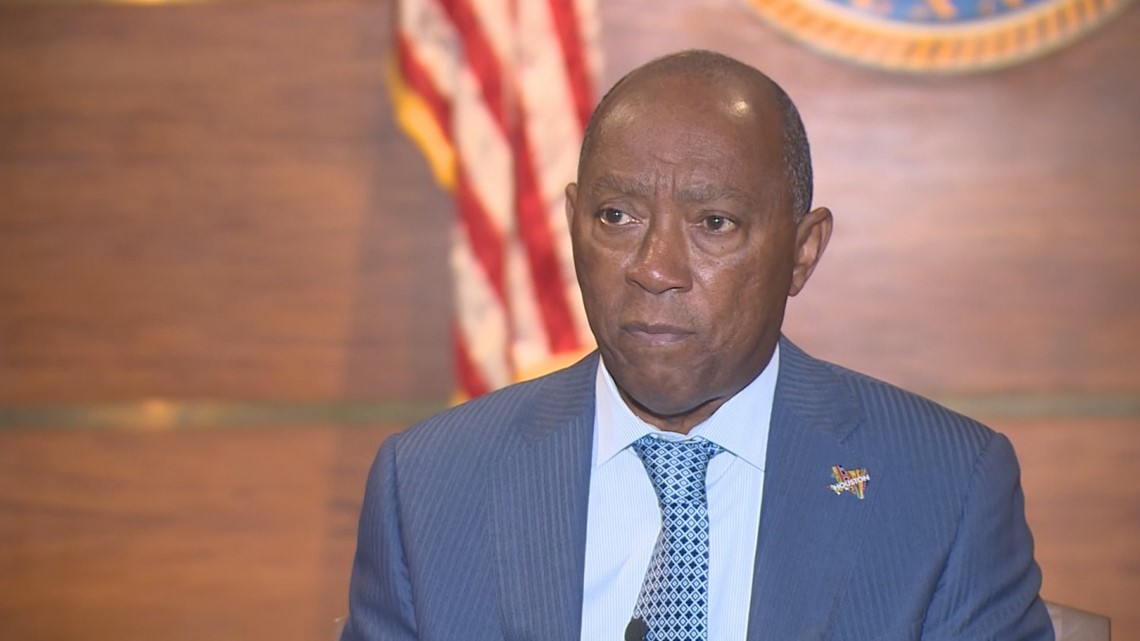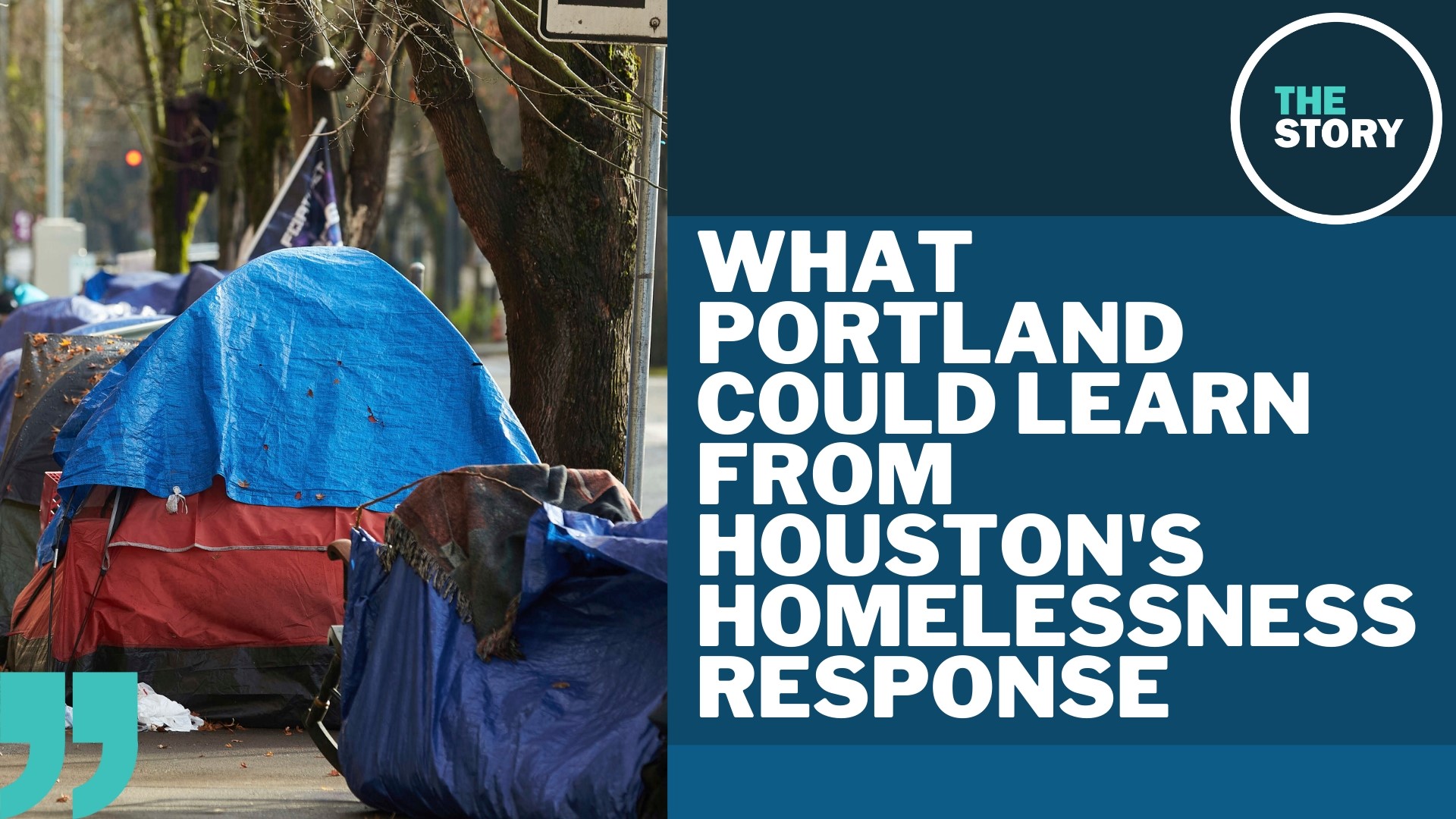PORTLAND, Ore. — When it comes to Portland's homeless crisis, effective solutions sometimes seem out of reach.
Portland may want to take a page from the playbook of Houston, Texas — one of America's largest and most diverse cities — which has seen a massive reduction in its homeless population since 2011.
The New York Times reports that over the past decade, Houston has moved 25,000 people off the streets and into permanent housing. The city has utilized what's known as a "housing first" policy. They don't sweep homeless camps, wait for those people to move somewhere else, then clear out the camps again. Social workers meet with unhoused people and offer them permanent housing in one-bedroom apartments, with no sobriety requirements like many temporary shelters have.
The city then works with nonprofits to continuously offer services, like addiction and mental health treatment, to the people that have moved into that housing.
Portland and Houston are very different cities — the most obvious difference being size. Houston is the country's fourth-most populous city, with a population of more than 2.3 million in city limits alone, while Portland has about 650,000 residents.
But a decade ago, the two cities had a very similar homeless crisis. In 2011, Multnomah County had a homelessness rate of 23 people per 10,000; in Harris County, Texas, where Houston is located, the rate was 21 unhoused people per 10,000.
In the years since, Houston implemented its housing first policy. Harris County's per capita homelessness rate has dropped to just 7 per 10,000 people. Meanwhile, Multnomah County's rate has nearly tripled to 63 per 10,000 people.
"I think what is noticeable is that two years after the fact, most of those people are still housed, and that's because of the permanent wraparound services, because in many cases we don't wait for people to get themselves clean or stabilized, so to speak," explained Houston Mayor Sylvester Turner. "So if there are persons with, for example, substance abuse, you don't go and get yourself detoxed and all of that, and then you qualify. Or if you're suffering from mental behavioral health issues, it's not like you go and get the treatments and you're stabilized, and then you are housed. We kind of do things all at the same time, we get you off the streets, we get you in an apartment and we provide the wraparound services all at the same time."
Turner said a big reason the program has been successful is that outreach workers are persistent. They don't just approach someone once and leave if they don't want to move. Outreach workers might revisit them five or more times to convince them. Then once they are housed, those wraparound services help them see the light at the end of the tunnel.
"We are not abandoning them. We are not putting them in an apartment and then walking away from them. We are putting them in an apartment, but we come along with them. We come with the services that they need, whether they're mental health services, substance abuse services, they need assistance with training. They need to be able to navigate to where services are," Turner explained.


The mayor told a story about helping one man get into housing.
"We went back and forth, back and forth. The first objection he made he said, look, the shelters don't allow pets. We said, we can address that. You can take your pet. And then he said, there are various curfews, and there are restrictions — they don't particularly like restrictions at shelters. So we said, okay, we can address. We're talking about putting you in your own apartment, your own unit," Turner said. "Then there was a great deal of distrust. You're just trying to fool us. And then we came back and said, why don't you allow us, we'll take you, your pet, whatever belongings you want, we'll take you to your place, and then if you don't like it, we'll bring you back. It was at that point that the person said yes, and the person was effectively housed."
Houston hasn't solved homelessness, to be sure. There are still people living on the street and in camps, but the city has made huge progress in the past 10 years. Turner said the biggest challenge right now is finding available one-bedroom apartments.
Housing availability is an issue Multnomah County knows well. It recently started offering incentives to landlords who will rent vacant units to homeless people with an assurance from the county that rent will be paid. Houston's mayor said the city is working with landlords in a similar way.
KGW reached out to Portland Mayor Ted Wheeler and all four city commissioners to ask if a housing first policy could work in Portland. Only Commissioner Jo Ann Hardesty responded by deadline.
"I would much rather see Portland leaders focused on ambitious, compassionate, permanent solutions to our houseless crisis like what Houston has worked towards over destabilizing sweeps that just move people into neighborhoods, criminalizing poverty, and concerning proposals for forced entry into temporary mass shelters. I also want to see more measurable outcomes included in Portland’s inter-governmental agreement with Multnomah County to ensure we are seeing results with taxpayer dollars," Hardesty said in a statement.

